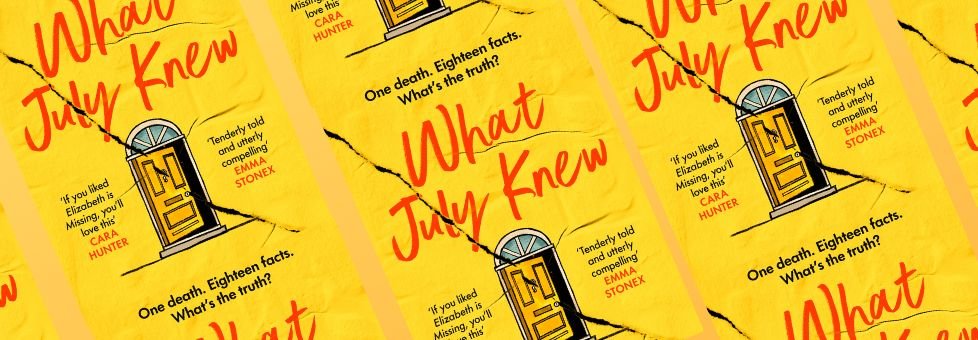What July Knew Book Club: Discussion points
Are you planning to read What July Knew with your book club?
I’ve put together some questions and discussion points for you to help get conversation and debate going.
NB. SPOILER ALERT! Read the book first!
The book is set in 1995. How old were you in 1995? What are your memories of the 90s - what music did you listen to, what clothes did you wear, what books did you read?
Bring a photo of you from the 90s to share with your reading group!
I wrote to my childhood friends to ask them questions about our lives together, as part of research for the book. Are you still in touch with any primary school friends? What are some of your best memories of time spent with them?
Which character in What July Knew would you most like to meet?
How did July change through the story? Did your opinion of her change?
I wanted to write about how easy it is for domestic abuse to take place unchecked - how even the best of us can see something troubling but not do anything about it. Perhaps we don’t know the victim well or think we might have misunderstood a situation. Maybe we don’t want to interfere or are embarrassed about doing so. What do you think? Have there been times when you’ve seen something concerning but haven’t felt in a position to act on it?
There are certain chapters that open with the viewpoint of a character other than July - for instance, chapter nine (Shell’s point of view). Why do you think I did this? Do you think it adds anything to the story? (The other chapters are: 2, 6, 14, 17, 22, 24, 29, 34 and 42.)
I am intrigued by ‘Good Samaritan’ events such as Rob helping July’s mum back in 1985 when she is in labour - specifically what happens when things go wrong, as with Rob. Helping can sometimes seem a risky thing to do - for example, I have doctor friends who are reluctant to speak up if a doctor is needed on a flight, because they are nervous of being held responsible if something goes wrong. And we have all seen stories in the media about someone stepping in to stop a fight but getting injured - or worse - as a result. Have you ever stepped in to help a stranger? Would you?
What would you do, in July’s stepmother, Shell’s, shoes? Why do you think women so often stay with their abusers?
The novel is mostly told from July’s perspective. Have you read other books (aimed at an adult readership) with young protagonists? Do you like them? How would the book have been different if it had been told entirely from one of the adults’ points of view?
What did you think of Sylvie at the start, and at the end? Did your feelings towards her change?
The people July ends up with at the end of the book are not her biological family. And in the final letter of the book, the writer says: ‘They say you can’t choose your family’. Who are the people in your life that are as good as - or closer than - your biological family members? Do you have a surrogate mother who you turn to for advice? Or a friend who is so close you feel like sisters?
July’s grandmother, Yaya, doesn’t talk about her daughter. What do you make of this? Does it make you think less of her, or can you sympathise with her reasons?
In the opening chapter, Miss Glover tells the class: ‘I’d like you to think about whether it’s important to know where you come from, to work out who you are yourself.’ How would you answer this? Is it necessary, or helpful, to know about your parents and other ancestors as you work out your own place in the world?
Did you guess any of the twists in the book?
How did you feel about the ending of the novel? Was it what you expected to happen?
If you could ask the author of this book one question, what would it be?
